Professorships & Chairs
Endowed positions in the Paul G. Allen School
Frank & Wilma Bradley Chair
Established in 1994 through a series of gifts eventually totaling $1,500,000 from Wilma Bradley
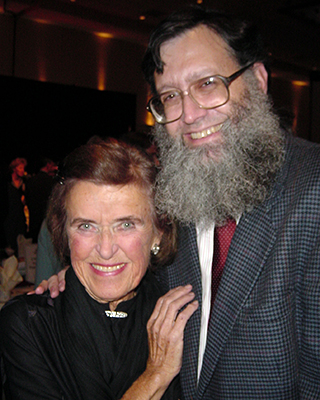
Wilma Bradley, a special friend of the University of Washington, was a volunteer, a philanthropist, and a patron of the arts. In addition, she was involved in several local clubs, and maintained a keen interest in a broad range of intellectual pursuits through attendance at many University functions. She continued to actively manage her investments, maintaining an avid interest in the stock market — efforts that made this gift and others possible.
Her late spouse Warren Francis “Frank” Bradley, led a varied career in the U.S. Army for over 20 years, being a member of the general staff, serving in Korea, and participating as an Army observer with the U.S. Navy expedition to the South Pole in preparation for the Geophysical Year. The Bradleys met in Europe when both were working for NATO — she as an interpreter for the American forces in Germany, and he as a liaison officer. Upon his retirement in Seattle in 1964, the Bradleys became involved in real estate investment and property management. Frank Bradley died in 1966.
Wilma’s personal involvement with Allen School faculty and students, and her interest in their work and in the broad impact of technology on society, made the Bradley Chair special. Wilma passed away on October 22, 2022.
Current holder: Tom Anderson
Bill & Melinda Gates Chairs in Computer Science
Established in 2000 with a gift of $3,000,000 from the Bill & Melinda Gates Foundation
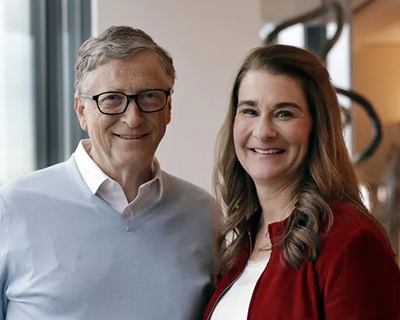
The Bill & Melinda Gates Foundation reflects the philanthropic priorities of its co-founders, William H. Gates III and Melinda French Gates. The Foundation supports global health and learning, with the hope that in the 21st century, advances in these critical areas will be available to all people.
Through this gift, the Gates Foundation established two Endowed Chairs — the first Endowed Chairs in UW Computer Science & Engineering.
At the time of the gift, William H. Gates III is chair and CEO of Microsoft Corporation. In addition to his involvement in key management and strategic decisions at Microsoft, he plays an important role in the technical development of new products. Through his corporate vision and his philanthropy, he has uniquely influenced the rapidly expanding use of computers in the workplace, in education, and in countless aspects of daily life.
Melinda French Gates earned her bachelor’s degree in computer science and economics and her master’s in business administration from Duke University. Upon graduation, she joined Microsoft where she played a leadership role in the development of the company’s multimedia and Web-based products. She retired from Microsoft two years after her marriage to William H. Gates III, and she is involved in a variety of philanthropic activities that support the arts, social services, and education, including her position as a trustee of Duke University.
Bill and Melinda have gone on to support our program in countless impactful ways in subsequent decades.
Current holders: Magdalena Balazinska, Anna Karlin
Wissner-Slivka Chair
Established in 2004 with a gift of $1,000,000 from the Wissner-Slivka Foundation, complemented by $500,000 in matching funds
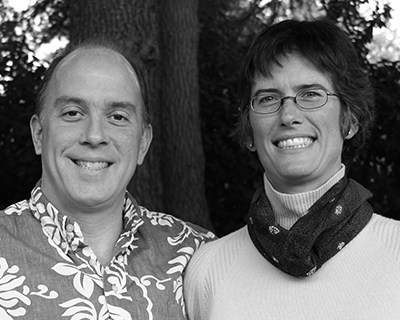
The Wissner-Slivka Foundation was established by Lisa Wissner-Slivka and Benjamin W. Slivka in 1997 as a 501c3 private foundation. The bulk of its grants have been in support of education.
Lisa Wissner-Slivka earned a B.A. in Computer Studies from Northwestern University in 1985 and an M.B.A. from the University of Washington in 1988. She worked at Microsoft as a program manager and product manager on programming language tools and electronic mail applications for six years. At the time of the gift, she serves on the boards of the Seattle Children’s Theater and the Bellevue Schools Foundation and is chair of the Policy and Advocacy Committee for Social Venture Partners (SVP) and the SVP Lead Partner for the Kindering Center. Her past board service includes the Bush School and the Overlake Hospital Foundation, and she was co-chair of the Kindering Center capital campaign that was completed successfully in 2001. She ran her fourth marathon in New York City in November 2004. Benjamin W. Slivka grew up in the Mount Baker neighborhood of Seattle and graduated from Garfield High School. He met Lisa at Northwestern University, where he earned B.S. degrees in Computer Science and Applied Mathematics in 1982 and an M.S. degree in Computer Science in 1985. He spent 14 years at Microsoft working on OS/2, MS-DOS, Windows, Java, and MSN. Perhaps his most visible project at Microsoft was starting the Internet Explorer team and leading it through the release of IE 3.0. After a brief stint at Amazon.com, he retired in 2000 to focus on his family and philanthropy. He is a Trustee of Northwestern University, a director of TeachFirst.com and the Garfield High School Foundation, and the SVP Lead Partner for Seattle MESA. He dabbles in digital photography and maintains a handful of websites.
Amazon Professorships in Machine Learning
Established in 2012 with a gift of $2,000,000 from Amazon

At the initiative of Amazon CEO Jeff Bezos, this endowment was established to enhance the University’s ability to recruit and retain distinguished faculty in machine learning as that field may evolve.
The endowment was established with sufficient funds to create two professorships, each of which is known as the Amazon Professorship in Machine Learning.
Current holders: Byron Boots, Noah Smith
Jean-Loup Baer Professorship
Established in 2008 with a gift from Anne Dinning and Michael Wolf
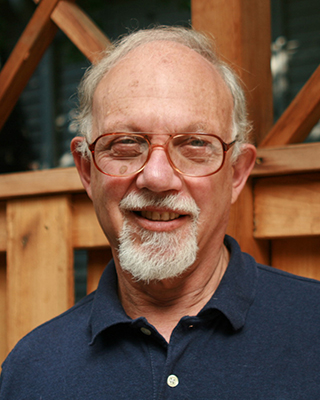
Anne Dinning joined the D. E. Shaw group in 1990, after receiving a B.S. in computer science from the University of Washington and a Ph.D. in computer science from New York University’s Courant Institute of Mathematical Sciences, where she won the Howard Grad Memorial Award for Outstanding Ph.D. Candidate. From 1995 until her retirement in 1999, she was the managing director responsible for the firm’s worldwide asset management activities (including the equity and equity-linked strategies and fixed income-related strategies), as well as in 1996 for the management of an international broker dealer business based in London. In August 2002, Dr. Dinning rejoined the D. E. Shaw group as a managing director. At the time of this gift she is a member of the executive committee of D. E. Shaw & Co., L.P. and D. E. Shaw & Co., L.L.C., in which capacity she jointly supervises the D. E. Shaw group’s worldwide asset management businesses. She serves as chief investment officer of D. E. Shaw Investment Management, L.L.C. and is a member of that entity’s executive committee, as well as of the D. E. Shaw group’s private equity and real estate investment committees. Dr. Dinning is a member of the Asset Managers’ Committee of the President’s Working Group on Financial Markets. She was the 2006 recipient of the Industry Leadership Award presented by 100 Women in Hedge Funds, an organization committed to the professional advancement of women in the alternative investment industry.
Michael Wolf received his B.S. in Physics and Applied Math from U.C. Berkeley in 1984 and his Ph.D. in computer science from Stanford University in 1992. Dr. Wolf joined the D. E. Shaw group in 1992, and later worked at various firms in the financial and technology industries. Dr. Wolf’s 1991 paper on compilation for improved data locality was included in a 2004 “Best Of“ retrospective of the ACM SIGPLAN Conference on Programming Language Design and Implementation (PLDI). At the time of this gift Dr. Wolf is a full-time stay-at-home parent.
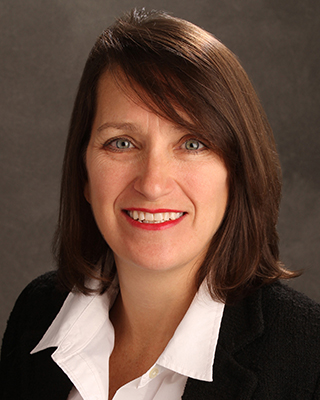
Anne and Michael appreciate the opportunities that have been made available to them because of their excellent educations, and want to make similar opportunities available to others.
They are pleased to honor Jean-Loup Baer through the naming of this Endowed Professorship. Dr. Baer, as a freshly minted UCLA Ph.D. in 1969, became the first junior faculty member hired by the University of Washington Computer Science Group. A leading computer architect, he devoted his entire career to UW CSE, and chaired the department from 1988-93 when he guided its transition to the College of Engineering. He retired as Emeritus Professor in 2003. Jean-Loup taught the first course that Anne took following her admission to UW’s Computer Science B.S. program.
Current holder: Tim Althoff (Career Development)
Boeing Professorship
Established in 1990 with $500,000 of a $5,000,000 gift from The Boeing Company to the University of Washington College of Engineering
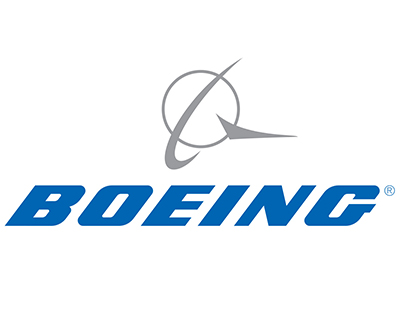
The Boeing Professorship was the first Endowed Professorship established in Computer Science & Engineering at the University of Washington.
Boeing is the world’s largest aerospace company and leading manufacturer of commercial jetliners, defense, space and security systems, and service provider of aftermarket support. As America’s biggest manufacturing exporter, the company supports airlines and U.S. and allied government customers in more than 150 countries. Boeing products and tailored services include commercial and military aircraft, satellites, weapons, electronic and defense systems, launch systems, advanced information and communication systems, and performance-based logistics and training.
Boeing has a long tradition of aerospace leadership and innovation. The company continues to expand its product line and services to meet emerging customer needs. Its broad range of capabilities includes creating new, more efficient members of its commercial airplane family; designing, building and integrating military platforms and defense systems; creating advanced technology solutions; and arranging innovative financing and service options for customers.
Current holders: Su-In Lee, Linda Shapiro
Robert E. Dinning Professorship
Established in 2008 with a gift from Anne Dinning and Michael Wolf
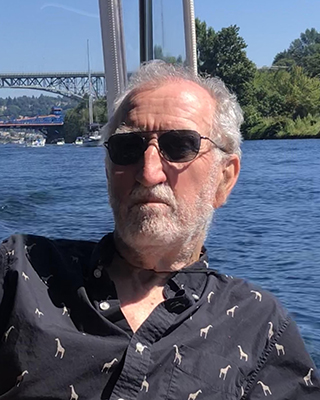
Anne Dinning joined the D. E. Shaw group in 1990, after receiving a B.S. in computer science from the University of Washington and a Ph.D. in computer science from New York University’s Courant Institute of Mathematical Sciences, where she won the Howard Grad Memorial Award for Outstanding Ph.D. Candidate. From 1995 until her retirement in 1999, she was the managing director responsible for the firm’s worldwide asset management activities (including the equity and equity-linked strategies and fixed income-related strategies), as well as in 1996 for the management of an international broker dealer business based in London. In August 2002, Dr. Dinning rejoined the D. E. Shaw group as a managing director. At the time of this gift she is a member of the executive committee of D. E. Shaw & Co., L.P. and D. E. Shaw & Co., L.L.C., in which capacity she jointly supervises the D. E. Shaw group’s worldwide asset management businesses. She serves as chief investment officer of D. E. Shaw Investment Management, L.L.C. and is a member of that entity’s executive committee, as well as of the D. E. Shaw group’s private equity and real estate investment committees. Dr. Dinning is a member of the Asset Managers’ Committee of the President’s Working Group on Financial Markets. She was the 2006 recipient of the Industry Leadership Award presented by 100 Women in Hedge Funds, an organization committed to the professional advancement of women in the alternative investment industry.
Michael Wolf received his B.S. in Physics and Applied Math from U.C. Berkeley in 1984 and his Ph.D. in computer science from Stanford University in 1992. Dr. Wolf joined the D. E. Shaw group in 1992, and later worked at various firms in the financial and technology industries. Dr. Wolf’s 1991 paper on compilation for improved data locality was included in a 2004 “Best Of“ retrospective of the ACM SIGPLAN Conference on Programming Language Design and Implementation (PLDI). At the time of this gift Dr. Wolf is a full-time stay-at-home parent.

Anne and Michael appreciate the opportunities that have been made available to them because of their excellent educations, and want to make similar opportunities available to others.
They are pleased to honor Anne’s father, Robert E. Dinning, through the naming of this Endowed Professorship. Robert Dinning graduated from the University of Washington Electrical Engineering department with a B.S. in 1961 and an M.S. in 1967. He went on to have a successful career at both Boeing and Texas Instruments working on the design of missile control systems and secure communication systems. He has remained an avid Husky football supporter.
Current holder: Leilani Battle (Career Development)
Susan J. Eggers Professorship
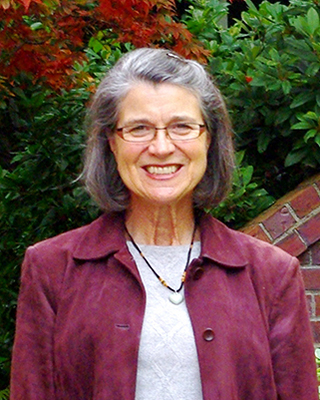
Susan Eggers joined the University of Washington faculty in 1989. A leading computer architect, she was elected a Member of the National Academy of Engineering in 2006 and a Fellow of the American Academy of Arts & Sciences in 2013. She was also elected a Fellow of ACM, IEEE, and the American Association for the Advancement of Science. In 2018 she became the first woman to receive the Eckert-Mauchly Award, the most prestigious honor in the computer architecture field. She retired in 2011.
After earning her bachelor’s degree in economics, Susan worked in a variety of roles for nearly two decades before turning her attention to computer architecture. She joined the University of Washington at the age of 47 after completing her Ph.D. at the University of California, Berkeley. Susan would more than make up for lost time by producing some of the most significant and enduring contributions to the field of computer architecture.
Most noteworthy among these was her role in the development and commercialization of simultaneous multithreading (SMT). While chip manufacturers were achieving rapid gains in memory and logic in the mid-1990s, those physical manifestations of Moore’s Law failed to generate the expected improvements in performance. To Susan, the most promising approach to translate exponential growth in chip density into enhanced performance was to increase parallelism, or the ability of computers to run calculations concurrently.
Susan — working with her Allen School faculty colleague Hank Levy, several graduate students, and Joel Emer (then at Digital Equipment Corporation) — drove the SMT revolution, which boosted parallelism, and with it, performance. SMT combines hardware multithreading with superscalar processor technology to enable multiple independent threads to issue instructions to multiple functional units in a single cycle. Susan and her collaborators demonstrated several substantial advantages that SMT offered over other architectures, including higher throughput, increased speed, and greater flexibility in hardware design. SMT faced considerable skepticism, but over the next eight years Susan and her collaborators in academia and industry would refine and validate SMT, which became an essential component in the processors produced by industry leaders such as Intel and IBM. Susan co-authored roughly a dozen papers about SMT, two of which earned Test of Time Awards (in 2010 and 2011, respectively) from the International Symposium on Computer Architecture.
Susan also made significant, early-career contributions in cache coherency, a technique for maintaining consistent data across shared memory multiprocessors. These included the first data-driven study of multiprocessor data sharing — which was instrumental in advancing the field’s understanding of hardware and software coherency techniques — as well as novel cache coherency protocols.
Susan participated in WaveScalar, a dataflow instruction set architecture and execution model designed for scalable, low-complexity/high-performance processors. WaveScalar is unique among dataflow architectures in efficiently providing traditional memory semantics to execute applications written in imperative, rather than hardware description, languages.
Susan’s interests in performance improvements extended beyond chip design. For example, she was a member of the team that built DyC, an easy-to-use system for dynamic compilation in C that was more expressive, flexible, and controllable than previous annotation-based approaches. She was also a member of the team that developed CHiMPS, a C-to-FPGA synthesis compiler that enabled developers to program FPGAs in an imperative language and memory model, while still providing greater performance and less power than a CPU.
A wonderful article describing Susan’s extraordinary journey was published by the IEEE Computer Society at the time of her receipt of the Eckert-Mauchly Award. Susan concluded her inspirational acceptance speech with a comment on retirement life: “Although I’m no longer a computer architect, I haven’t left architecture. What you see behind me are the results of a new in-retirement career as a landscape architect. I’ve transformed about half an acre of back yard from a steep slope of blackberries, horse tails, and bog into a lovely garden of small trees, shrubs, perennials, and groundcover with winding stone paths up the hillside and a small stream descending down. I love it! Retirement is pretty great too.”
Current holder: Michael Ernst
Guestrin Professorship in Artificial Intelligence & Machine Learning
Established in 2016 with a gift of $1,000,000 from Turi, Inc.
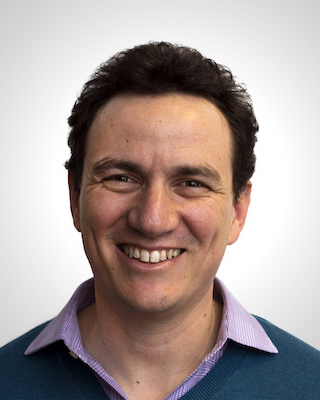
Carlos Guestrin joined the University of Washington faculty in 2012 as the Amazon Professor of Machine Learning. His GraphLab software is an open source, graph-based, high performance, distributed computation framework, written in C++. While GraphLab was originally developed for machine learning tasks, it has found great success at a broad range of other data-mining tasks, out-performing other abstractions by orders of magnitude.
In 2013, Carlos founded GraphLab Inc. to expand development support of the GraphLab open source project. The startup raised a $6.75M Series A from Madrona Venture Group and New Enterprise Associates (NEA), and an $18.5M Series B from Vulcan Capital and Opus Capital with participation from Madrona and NEA, meanwhile changing its name to Dato and then to Turi.
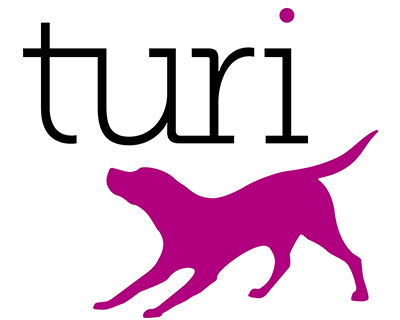
In 2016, Turi was acquired by Apple Inc. for $200,000,000. This professorship was created in Carlos’s honor by the Board of Directors of Turi at the time of the Apple acquisition.
Learn more in this blog post announcing the establishment of the professorship.
Brett Helsel Career Development Professorship
Established in 2017 with gifts totaling $500,000 from John G. Connors, Simone Helsel, Jeffrey S. Hussey, and others

Brett Helsel, a friend and supporter of the Paul G. Allen School of Computer Science & Engineering, passed away on July 10, 2014. A passionate technologist, Brett had the rare distinction of shaping the products at F5 Networks and Isilon Systems, two of the region’s most important technology companies. Following positions at Lockheed Missiles and Space, Digital Equipment Corp., and Wall Data, Brett joined F5 in 1998 as an early member of the executive team, rising to the position of Chief Technology Officer and shaping the company’s product direction prior to its groundbreaking IPO. He left F5 in 2003 to start his own venture-backed security software company, Lockdown Networks, before being tapped by Isilon Systems to help lead its turnaround as Senior Vice President of Engineering.
Brett was an equally passionate believer in the power of higher education to transform the lives of students and the economies of regions. He was engaged with the Allen School from the moment he arrived in Seattle. He inspired the Allen School’s students on his many visits (a typical snippet from a course presentation: “If you’re at a stop light headed for work and you’re not raring to get your foot on the gas, you should consider your next position!”). His primary focus, though, was advancing the careers of top young faculty members – starting when he arranged for DEC to donate equipment to eight of UW’s finest junior faculty in a number of fields of science and engineering to meet the industry match requirement of their National Science Foundation Presidential Young Investigator Awards, and continuing through to his successful advocacy with EMC after the Isilon acquisition. And in typical Brett style, he was very much hands-on: he interacted closely with the faculty he supported, and built strong relationships throughout CSE.
The Brett Helsel Career Development Professorship in Computer Science & Engineering was established by Brett’s friends and loved ones to celebrate his life and to serve as a longstanding reminder of his passion for innovation and his many contributions to the Allen School and the tech industry.
Current holder: Franziska Roesner (Career Development)
Richard E. Ladner Professorship
Established in 2008 with a gift from Anne Dinning and Michael Wolf
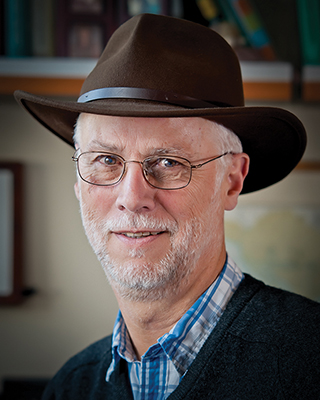
Anne Dinning joined the D. E. Shaw group in 1990, after receiving a B.S. in computer science from the University of Washington and a Ph.D. in computer science from New York University’s Courant Institute of Mathematical Sciences, where she won the Howard Grad Memorial Award for Outstanding Ph.D. Candidate. From 1995 until her retirement in 1999, she was the managing director responsible for the firm’s worldwide asset management activities (including the equity and equity-linked strategies and fixed income-related strategies), as well as in 1996 for the management of an international broker dealer business based in London. In August 2002, Dr. Dinning rejoined the D. E. Shaw group as a managing director. At the time of this gift she is a member of the executive committee of D. E. Shaw & Co., L.P. and D. E. Shaw & Co., L.L.C., in which capacity she jointly supervises the D. E. Shaw group’s worldwide asset management businesses. She serves as chief investment officer of D. E. Shaw Investment Management, L.L.C. and is a member of that entity’s executive committee, as well as of the D. E. Shaw group’s private equity and real estate investment committees. Dr. Dinning is a member of the Asset Managers’ Committee of the President’s Working Group on Financial Markets. She was the 2006 recipient of the Industry Leadership Award presented by 100 Women in Hedge Funds, an organization committed to the professional advancement of women in the alternative investment industry.
Michael Wolf received his B.S. in Physics and Applied Math from U.C. Berkeley in 1984 and his Ph.D. in computer science from Stanford University in 1992. Dr. Wolf joined the D. E. Shaw group in 1992, and later worked at various firms in the financial and technology industries. Dr. Wolf’s 1991 paper on compilation for improved data locality was included in a 2004 “Best Of“ retrospective of the ACM SIGPLAN Conference on Programming Language Design and Implementation (PLDI). At the time of this gift Dr. Wolf is a full-time stay-at-home parent.
Anne and Michael appreciate the opportunities that have been made available to them because of their excellent educations, and want to make similar opportunities available to others.

They are pleased to honor Richard E. Ladner through the naming of this Endowed Professorship. Dr. Ladner joined the Computer Science Group at the University of Washington in 1971 when he completed his Ph.D. at the University of California, Berkeley. He spent his entire career at the University and is well known for his work in theoretical computer science and accessible computing. He served in many capacities including Undergraduate Program Coordinator, Graduate Program Coordinator, and Faculty Coordinator for the Professional Master’s Program. Richard taught computer science theory to Anne in her junior year and supervised her senior project. Anne and Richard worked together to help raise local funding for the American Association of the Deaf-Blind Convention held in Seattle in 1984.
Current holder: Jen Mankoff
Edward D. Lazowska Professorships
Established in 2020 with initial gifts from Peter Lee, Jeff Dean, Harry Shum and Brad Smith, subsequently joined by more than 200 additional donors
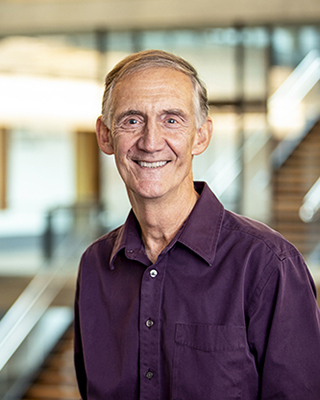
Throughout his career, Ed Lazowska has impacted and influenced the lives and careers of countless students and colleagues, and has been instrumental in helping the Paul G. Allen School of Computer Science & Engineering grow in influence and prominence to join a small handful of top programs in the country.
In August 2020, Ed turned 70. Peter Lee and Jeff Dean proposed to honor Ed for this milestone birthday, and set out to raise funds to create a set of endowed Lazowska Professorships. Harry Shum and Brad Smith came together with Peter and Jeff to quietly fund the first Lazowska Professorship. They have since been joined by more than 200 additional donors.
Current holders: Luis Ceze, Shayan Oveis Gharan
To learn more about this special initiative, please read our blog post. Our thanks to all of our donors:
Founding Donors
- Jeff Dean & Heidi Hopper
- Peter & Susan Lee
- Harry Shum & Ka Yan Chan
- Brad Smith & Kathy Surace-Smith
Leadership Donors
- Tom Alberg
- Jim & Catherine Allchin
- Allen Institute for Artificial Intelligence
- Dave Cutler
- Anne Dinning
- Cathy & David Habib
- Don & Cindy Hacherl
- Eric & Mary Horvitz
- Gary & Chris Kimura
- Shun-Tak Leung & Pik Sum Li
- Daniel Ling & Lee Obrzut
- Madrona Venture Group
- Craig & Marie Mundie
- Sujal & Meera Patel
- Mike & Jackie Schmidt
- Rob Short & Emer Dooley
- Brad Silverberg
- Charles & Lisa Simonyi
- Lisa Wissner-Slivka & Ben Slivka
- Guy “Bud” Tribble & Susan Barnes
Microsoft Professorship
Established in 1995 with $500,000 of a gift of $1,000,000 from Microsoft
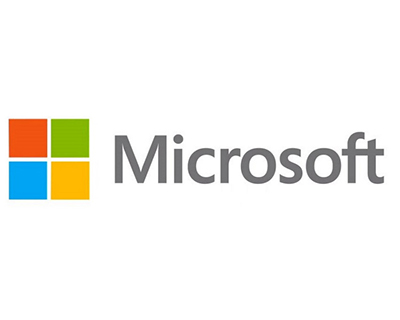
For many decades Microsoft has been the strongest corporate supporter of Computer Science & Engineering at the University of Washington.
As the capstone gift of the Campaign for Washington — the University of Washington’s fundraising campaign of the late 1980s and early 1990s — Microsoft committed $1,000,000 to Computer Science & Engineering. These funds were used to establish the Microsoft Professorship, the Microsoft Graduate Fellowship, the Microsoft Undergraduate Scholarship, and the Microsoft Endowed Fund.
At the time of the gift, the gift agreement stated:
Microsoft is the worldwide leader in software. The Company develops, markets and supports a wide range of systems and applications software for personal computers. By making it easier to use personal computers for an increasing number of purposes, Microsoft products have contributed to the “PC revolution” during the last 15 years. The growth of Microsoft has paralleled the increase in the number of people who use personal computers in this country, from one million in 1980 to more than 100 million today.
Microsoft’s $1 million commitment to the University of Washington is the largest ever made by the Company to date. By designating the gift to the Department of Computer Science & Engineering, the Company has made an important investment in the future of the software industry. According to Microsoft Chair and CEO, Bill Gates III, “Institutions such as the University of Washington provide the software industry with the research and development talent we will need to continue our success.”
Current holder: Dan Suciu
Jerre D. Noe Professorship
Established in 2006 with $250,000 in gifts from friends of Jerre D. Noe, complemented by $250,000 in matching funds
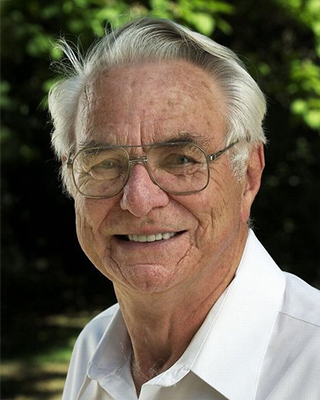
This endowment honors Professor Jerre D. Noe’s visionary leadership in Computer Science & Engineering at the University of Washington.
A leader of SRI’s ERMA project, which pioneered electronic banking, Jerre was recruited to the University of Washington in 1968 to become the first chair of the Computer Science Group and its graduate program. Jerre guided the Computer Science Group to Sieg Hall, departmental status, and the introduction of a Bachelor’s program in 1975. He concluded his term as chair in 1976 and resumed activity as a faculty member, most notably as the leader of the Eden Project. The Eden Project — to construct an “integrated, distributed, object-oriented system” — received the first award in the National Science Foundation’s Coordinated Experimental Research Program, established the University of Washington as a leader in computer systems research, resulted in the University of Washington’s early connection to ARPANET, and contributed significantly to UW being ranked among the top ten computer science programs in the nation in the National Academies 1982 assessment of doctoral programs.
Jerre retired as Emeritus Professor in 1989. Throughout his UW career, he played a leading role in establishing the culture that guides Computer Science & Engineering to this day. He passed away on November 12, 2005.
Current holder: Jeffrey Heer
Senosis–Paul G. Allen Professorship
Established in 2020 with $1,000,000 through the generosity of professors Shwetak N. Patel and Julie A. Kientz, in connection with the acquisition of UW spinout Senosis Health by Google, and leveraging matching funds from the Paul G. Allen Professorship Matching Program
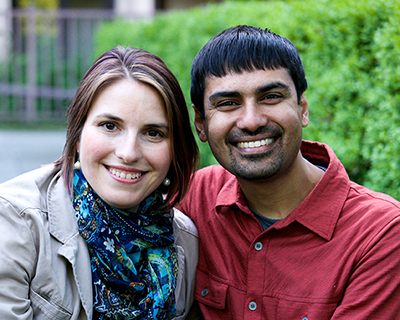
Thinking outside of the box and applying a broad definition to computing is what drives Shwetak and Julie’s research. The professorship held by Shwetak — the Washington Research Foundation Entrepreneurship Professorship — was essential to supporting much of the research that led to the Senosis Health startup. Shwetak and Julie are delighted that the acquisition of Senosis Health allows them to make the same opportunity available to others. They also recognize the risk the UW took by both of them as faculty despite their unique approach to research and impact at the time.
Shwetak and Julie were both hired as faculty at the UW in 2008, focusing on the application of computing to solve important problems in society. They each took a unique approach to research but are ultimately solving the same big problems of health and health disparities, accessibility, and sustainability through computing. They have a daughter Maya (born in 2012) and son Rohan (born in 2015).
Shwetak is the son of Naran and Kusum Patel and brother of Prof. Shrayesh Patel and Dr. Shweta Patel. His parents immigrated to the U.S. from India in the 1970s. Shwetak was born in Selma, Alabama, went to high school in Birmingham, Alabama, and earned his Bachelor’s and Ph.D. in Computer Science from the Georgia Institute of Technology in 2003 and 2008. At the time of this gift he is the Washington Research Foundation Entrepreneurship Professor in the Paul G. Allen School of Computer Science & Engineering and the Department of Electrical & Computer Engineering at the University of Washington, Seattle. Shwetak’s work has always focused on the application of computing to socially relevant problems like health and sustainability. While a professor at UW, he received the MacArthur “Genius” Award, a Presidential Early Career Awards for Scientists and Engineers (PECASE), a Sloan Fellowship, a Microsoft Faculty Fellowship, an MIT TR-35 award, and the ACM Prize in Computing. Much of Shwetak’s work involves the translation of basic science research to society through his entrepreneurial activities. Shwetak was a co-founder of a home energy monitoring company called Zensi (acquired by Belkin in 2010), a low-power home wireless sensing company called SNUPI Technologies (acquired by Sears in 2015), and a mobile health company called Senosis Health (acquired by Google in 2017).
Julie is the daughter of Carol and Thomas Kientz and sister of Jeremy Kientz. She was born in Marion, Ohio where she lived through high school. She attended the University of Toledo, receiving a B.S. in Computer Science & Engineering in 2002, and during that time had internships at UC Berkeley, Argonne National Laboratory, and Compaq Computers. She then went on to the Georgia Institute of Technology, where she received her Ph.D. in Computer Science, with a focus on human-computer interaction. At the time of this gift her research focuses on the design and evaluation of novel computing applications to support health, education, and families. Julie is currently Professor & Chair of the Department of Human Centered Design & Engineering at the University of Washington. She was named an MIT Innovator Under 35 in 2013, received an NSF CAREER award in 2009, has been awarded 8 Best Paper awards, and is the only professor in the College of Engineering to win both the Faculty Research (2014) and Faculty Teaching (2019) Innovator awards. She is also a co-founder of BrightSteps, a technology startup commercializing her research on early childhood developmental screening.
Shwetak, Julie, and their children enjoy traveling, hiking, snow sports, volunteering, and playing games together.
It is the Donors’ preference that this professorship support individuals who are committed to diversity-related work and whose record of research, teaching, service, and/or outreach reflects a commitment to diversity and equal opportunity.
Additional information is available on the this blog post announcing the establishment of the professorship.
Short-Dooley Professorship
Established in 2005 through a sequence of gifts eventually totaling $750,000 from Rob Short and Emer Dooley
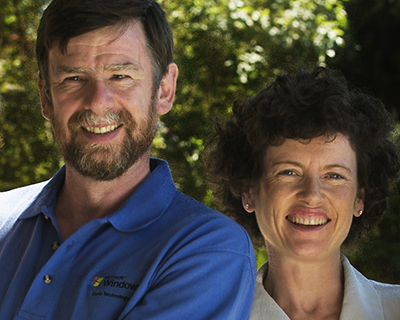
Rob Short and Emer Dooley have been tremendous friends of the Allen School and of the University of Washington in many ways over many years.
In 2005, Rob and Emer established the Short-Dooley Career Development Professorship with a gift of $500,000. Appreciation of the principal and a subsequent gift of $250,000 enabled its conversion to the Short-Dooley Professorship in 2019.
Robert Short grew up in Ireland, but moved to the United States to work on computer system design. Rob received his Master’s degree in Computer Science at the University of Washington in 1987, and during the course of his studies rediscovered the value of having a world-class University in the region. Rob was lucky enough to be a member of the original Microsoft Windows NT team and worked with some of the best people in the industry.
Emer Dooley graduated with a Bachelor’s degree in Electronic Engineering and a Master’s in Computer Engineering from the University of Limerick, Ireland. She moved to Seattle after working eight years as a hardware designer at Digital Equipment Corporation. Her involvement with the University of Washington began with an MBA in 1992, followed by a Ph.D. in 2000.
Rob and Emer believe strongly in the role of outstanding faculty. They want future generations of students to have the opportunity to work with, learn from, and be inspired by exceptional professors, preparing them to make an impact.
Current holder: Arvind Krishnamurthy
Chris & Heidi Stolte Professorship
Established in 2020 with a gift of $1,000,000 from Christopher and Heidi Stolte
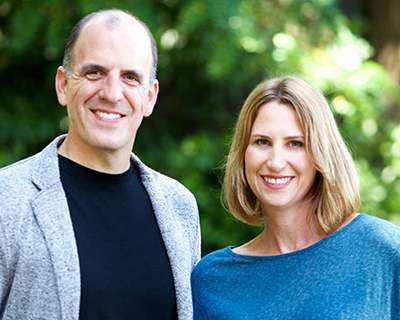
The Donors hope that this professorship, and its future holders, may help advance the development and use of technology to solve societal problems and improve social, environmental and economic outcomes. They are believers that technology can greatly augment and support the application of human creativity to challenging problems. They are also strong believers that new technology must be developed with intentional design consideration of societal impacts and ethical concerns. It is their hope that the work supported by this professorship will reflect both of these beliefs.
Chris Stolte is a father, computer scientist and entrepreneur. He received his Master’s and Ph.D. in Computer Science from Stanford University in 2003 and his B.Sc. from Simon Fraser University in 1997. His Ph.D. at Stanford was on the analysis and visualization of multidimensional databases. That research provided the basis for Tableau, a company he co-founded in 2003. Tableau’s products have been used by millions of users across tens of thousands of companies to more easily “see and understand data.” Tableau went public in 2013 and was acquired by Salesforce in 2019. Prior to Tableau, Chris also co-founded Beeline Systems, a digital mapping startup, that was acquired by Vicinity. Chris’s research has focused on the use of technology to support and augment human creativity and intelligence.
Heidi Stolte is a mother, former educator, community volunteer and philanthropist. Before moving to Seattle in 2003, Heidi was an elementary school teacher in Northern California where she grew up. She received her B.A. in Communication from UC San Diego and her Teaching Credential from San Jose State University. Heidi feels a strong passion for education and families and has focused her work in education equity.
Current holder: Georg Seelig
Torode Family Career Development Professorship
Established in 2004 with a gift of $333,333 from John Q. and Patricia M. Torode, complemented by $166,667 in matching funds
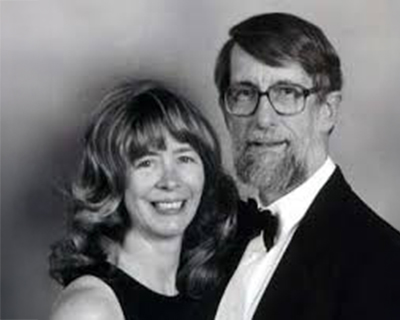
The purpose of this endowment is to enhance the University’s ability to attract and retain distinguished faculty in Computer Science & Engineering, and specifically to recognize and reward outstanding mid-career faculty in order to increase the likelihood that their careers continue to flourish and that they remain at the University.
John Torode received a Bachelor of Science degree in Physics from MIT in 1966. He entered the University of Washington as a graduate student in Physics, receiving a Masters degree in 1969. He then transferred to Computer Science, receiving a Masters in 1971 and a Ph.D. in 1972. John became a faculty member in the Department of EECS at UC Berkeley, but left Berkeley in 1975 to devote full time to Digital Systems, a company he had founded as a UW graduate student. John subsequently founded Digital Microsystems, Inc., Ioline Corporation, and IC Designs, which was acquired by Cypress Semiconductor in 1993.
Patti Torode received a Bachelor of Science degree in Computer Science from Iowa State University in 1973, and a Masters degree in EECS from UC Berkeley in 1974. She was a Member of the Technical Staff of Bell Laboratories from 1973-76, the Chief Operating Officer of Digital Microsystems, Inc., from 1976-84, and the Chairperson and CEO of D.W. Close (a major Seattle-based electrical contractor) from 1984-1997.
John and Patti believe strongly in the role of outstanding faculty at major research universities in creating opportunity.
Current holder: Hannaneh Hajishirzi
Washington Research Foundation / Thomas J. Cable Professorship
Established in 1999 with a gift of $500,000 from the Washington Research Foundation
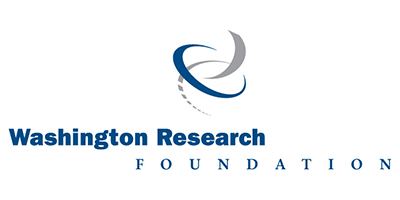
The Washington Research Foundation (WRF) incorporated as a private not-for profit organization in 1981 to help Washington state research institutions capture value from their emerging technologies. WRF initially focused on patenting inventions and licensing them to companies. From licensing proceeds, WRF Capital and the WRF Venture Center were established. Revenues generated from both licensing and contributions from WRF Capital allow the Foundation to make gifts to support scholarship and research at Washington state research institutions.
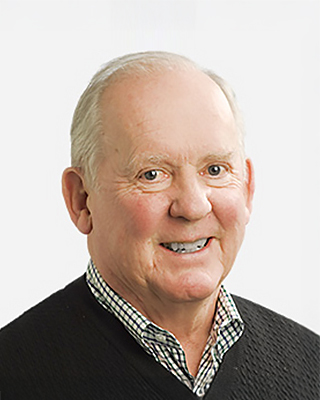
This professorship honors Thomas J. Cable for his contributions as a founding board member of the WRF. He has been a leader in encouraging the development of high-technology industry in this state and co-founded the venture capital firm of Cable and Howse in 1979. More than 100 companies, including Immunex, ZymoGenetics, and others benefited from those investments of venture capital.
A graduate of Harvard and Stanford universities, Tom Cable has been an active volunteer for the University of Washington and was a founding member of the UW Foundation Board of Directors (serving from 1988-1993 and again from 1995-1998).
Current holder: Shyam Gollakota
Washington Research Foundation Entrepreneurship Professorship
Established in 2008 with a gift of $400,000 from the Washington Research Foundation, complemented by $150,000 derived from the sale of Farecast to Microsoft

The Washington Research Foundation (WRF) incorporated as a private not-for profit organization in 1981 to help Washington state research institutions capture value from their emerging technologies. WRF initially focused on patenting inventions and licensing them to companies. From licensing proceeds, WRF Capital and the WRF Venture Center have been established.
The WRF mission is to capture and enhance the value of intellectual property created in Washington’s universities and other research institutions, and to support their scholarship and research. WRF does this in many ways, including finding smart and strategic ways to make gifts in support of scholarship and research. WRF has a long history of engagement with UW Computer Science & Engineering: WRF has incubated and invested in a number of Allen School startup companies, and WRF has invested in the Allen School directly through a number of philanthropic initiatives. The sale of Farecast, a company created by Allen School Professor Oren Etzioni, stimulates this current gift. The donor’s goal with this professorship is to provide support to faculty members who, like Oren Etzioni and in the best tradition of academia, combine visionary scholarship with active entrepreneurship.
Current holder: Shwetak Patel
Endowed positions in Electrical & Computer Engineering and in the College of Engineering
Cherng Jia & Elizabeth Yun Hwang Professorship
Established in 2015 with a gift of $1,000,000 from Cherng Jia and Elizabeth Yun Hwang
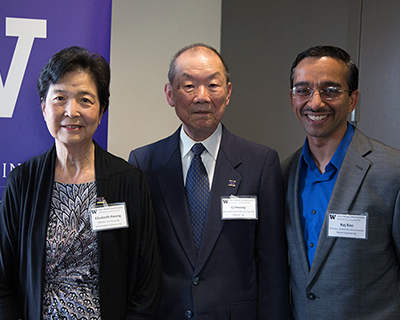
The primary purpose of this endowment is to enhance the University’s ability to recruit, retain and recognize distinguished faculty conducting research that leads to improvements in the quality of life for people with spinal cord injuries.
In the months after their daughter Karen’s car accident and spinal cord injury, Cherng Jia “C.J.” Hwang (UW EE Ph.D., ’66) and Elizabeth Yun Hwang (UW MLIS, ’65) sought care that would improve their daughter’s overall quality of life. While doctors encouraged adjustment to the new paralytic condition, the Hwangs believed Karen’s care should not focus solely on simple, day-to-day functioning.
With no prior knowledge on caring for those with quadriplegia, they searched for answers, for current treatments and for groundbreaking solutions. In this search, they learned of promises of nerve regeneration and damaged nerve bypass – grand treatments that could someday transform paralysis diagnoses. However, there were no solutions that offered immediate impact for those already suffering from spinal cord injury.
The Hwangs wanted to do more. With a passion for innovation and a commitment to those suffering from spinal cord injury, they launched their own research initiative — the Cherng Jia & Elizabeth Yun Hwang Endowed Professorship — that is housed in what was then the University of Washington Department of Electrical Engineering (EE) and is now the Department of Electrical & Computer Engineering (ECE).
This professorship is built on the Hwangs’ shared vision of making life better for those with paralysis. It supports the critical advancement of rehabilitation technologies for spinal cord injury and stroke. The nature of this research requires a multi-disciplinary approach. UW ECE is uniquely positioned to achieve this. The department’s depth of collaboration spans multiple departments and disciplines with ten faculty in joint appointments and over a dozen adjunct faculty appointments.
Because of this dedication to collaboration, the department has established valuable partnerships with the UW Medical School and Center for Neurotechnology (CNT), offering expertise in all areas of device rehabilitation design.
While a Ph.D. student in UW EE, Mr. Hwang received an education that prepared him for a lasting career at Bell Telephone Labs, something he attributes to the great mentorship by his adviser Professor Lynn Watt.
“The EE department of the UW gave me all the education I needed to enter the job market, and it was Professor Lynn Watt who had the greatest influence on my career path,” Mr. Hwang said. “He guided me into the field of semiconductors by offering me a research assistantship. He also recommended me to the recruiter from Bell Telephone Labs, which gave me the opportunity to work in their laser group. This is the place where I was engaged in the development of semiconductor lasers and later used the technology to start my first company.”
Mr. Hwang would go on to found three companies during his career: General Optronics Corp, which was the world’s first semiconductor laser manufacturer; Applied Optronics Corp, the world’s first company producing high power semiconductor lasers and subsystems for medical surgical applications; and Optronics International Corp., the first Taiwanese company developing and commercializing semiconductor lasers and subsystems for high-speed fiber optic communications.
Within each decade, Mr. Hwang remained at the frontier of laser research, taking his prior discovery and implementing it at an advanced level of operation. His discoveries have had a substantive, profound impact on the development of optoelectronics and communication in the United States, as well as abroad. However, for Mr. Hwang, his lasting legacy is the Cherng Jia & Elizabeth Yun Hwang Endowed Professorship.
Current holder: Rajesh P. N. Rao
Milton & Delia Zeutschel Professorship in Entrepreneurial Excellence
Established in 2017 with a gift of $1,000,000 from Milton & Delia Zeutschel
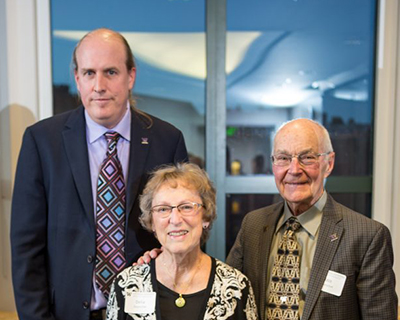
The Milton & Delia Zeutschel Professorship in Entrepreneurial Excellence was established through a generous gift from UW Department of Electrical Engineering alum Milton “Milt” Zeutschel (B.S. EE, ’60) and UW College of Education alum Delia Zeutschel (B.A., ’58) to support EE’s efforts in recruiting and retaining entrepreneurially-driven faculty, who will help build and sustain an engineering entrepreneurial ecosystem at the UW.
From a young age, Mr. Zeutschel recognized the importance of entrepreneurship and innovation while growing up on the prairie in North Dakota. He was the first member of his family to graduate from high school. He continued to push forward, being the first of his family to attend college. His UW EE education provided him with the technical skills to become an entrepreneur. The apt combination of education and personal discipline propelled Mr. Zeutschel to start from the ground up.
Over his career, he founded five companies, three of which — Zetec, Data I/O Corp. and Zetron, Inc. — met with resounding success. For Mr. Zeutschel, he is pleased that his success can give back to future generations of entrepreneurs.
A UW education is very important to both Delia and Milt Zeutschel. For Mr. Zeutschel, his time at UW EE shaped his career and offered him the skills to venture into uncharted territory as an entrepreneur. For Mrs. Zeutschel, her time studying at the UW College of Education laid the foundation for her work as a teacher.
Through this scholastic lens, the Zeutschels directed a significant portion of the endowment to support the Electrical Engineering Entrepreneurial Capstone Program (ENGINE), which enables current and future students in what is now the UW Department of Electrical & Computer Engineering to engage in real-world industry partnerships and gives local companies an opportunity to benefit from the vibrant innovation culture at UW ECE. In the years since its inception, ENGINE has seen significant growth: over 40 percent of the graduating UW ECE class participates in ENGINE.
Current holder: Joshua Smith
Term-limited Professorships & Chairs
Paul G. Allen Professorships
Funded on an annual basis with earnings from the Paul G. Allen School of Computer Science & Engineering Endowed Fund for Excellence
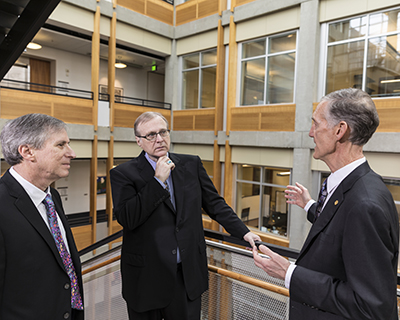
In 2017 — the 50th anniversary year of Computer Science & Engineering at the University of Washington — the late Paul G. Allen committed $40 million and Microsoft committed an additional $10 million to create an endowment to support the program. In recognition of these transformational commitments, and a long history of other significant gifts to the University of Washington, the Department of Computer Science & Engineering became the Paul G. Allen School of Computer Science & Engineering, elevating the profile of CSE within the university and linking it in perpetuity with the internationally renowned investor, philanthropist and computing pioneer.
It is our goal that earnings from the Allen Endowment not be permanently allocated to specific activities, but rather be flexibly utilized to support important initiatives. The annual funding of Paul G. Allen Professorships to recognize and support outstanding faculty is one such initiative.
Current holders: Dan Grossman, Kevin Jamieson (Career Development), Huijia (Rachel) Lin (Career Development), Katharina Reinecke (Career Development), Zachary Tatlock (Career Development), Stefano Tessaro (Career Development), Yulia Tsvetkov (Career Development)
Gaetano Borriello Professorship for Educational Excellence
Funded on an annual basis by the Paul G. Allen School of Computer Science & Engineering and the Department of Electrical & Computer Engineering
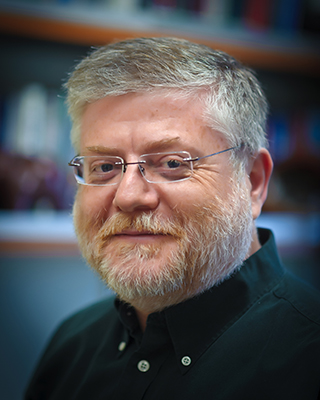
Gaetano Borriello joined the University of Washington faculty in 1988, and passed away decades before his time in 2015, following an extended battle with cancer. At the time of his death he was the Jerre D. Noe Professor of Computer Science & Engineering, and Adjunct Professor of Electrical Engineering, Human Centered Design & Engineering, and Information.
Gaetano arrived at UW following receipt of his Ph.D. in Computer Science from UC Berkeley. He had previously received an M.S. in Electrical Engineering from Stanford University, and served as a member of the research staff at the Xerox Palo Alto Research Center for eight years. From 2001 to 2003, on leave from UW, he founded Intel Research Seattle, which quickly became one of the premier research labs for work in ubiquitous computing.
Gaetano was the quintessential computer engineer. His career began in the areas of integrated circuits, circuit synthesis, reconfigurable hardware, and embedded system development tools. He transitioned into ubiquitous computing, and as director of Intel Research Seattle he launched projects in elder care and in location-aware computing. Later his focus had been applying mobile technologies to the problems of public health and development in low-resource settings. His group’s open-source mobile data collection tools, Open Data Kit, are in use on six continents in programs ranging across public health, documentation of human rights violations, and environmental monitoring. (Both Jane Goodall and the International Red Cross wrote offering their condolences following Gaetano’s death.)
Gaetano was a Fellow of the ACM and IEEE, a Fulbright Scholar, and a recipient of the UW CSE Undergraduate Teaching Award, the UW Distinguished Teaching Award, and the UW Marsha L. Landolt Distinguished Graduate Mentor Award.
As indicated by these awards, Gaetano was an extraordinary faculty member in every respect. While his research had tremendous impact, his focus was first and foremost on his students, on our educational programs in CSE and ECE, and on continually strengthening the bridges between our two units. He exemplified our mission at the University of Washington: to provide an extraordinary educational experience for our students, in which they discover, pursue, and achieve their potential; to conduct leading-edge research, but in the context of education rather than purely for its own sake; ultimately, to make the world a better place through the impact of our teaching, research, and mentoring.
To honor Gaetano and those who follow in Gaetano’s footsteps, the Paul G. Allen School of Computer Science & Engineering and the Department of Electrical & Computer Engineering elected to fund on an annual basis the Gaetano Borriello Professorship for Educational Excellence. The inaugural holder of the Borriello Professorship exemplifies all aspects of Gaetano’s legacy. Scott Hauck received his Ph.D. from the Allen School in 1995, co-supervised by Gaetano and fellow Allen School faculty member Carl Ebeling. Scott spent four years as a faculty member in Electrical & Computer Engineering at Northwestern University, then was lured back to Seattle by UW Electrical & Computer Engineering, where he has served on the faculty with great distinction, as well as serving as an Adjunct faculty member in Computer Science & Engineering. This is a clear case of the apple (Scott) not falling far from the tree (Gaetano, his mentor): Scott is a strong researcher, he is dedicated to his students and more broadly to educational excellence, and he has selflessly devoted enormous energy to improving the interface between the Allen School and ECE.
Current holder: Scott Hauck, professor, Department of Electrical & Computer Engineering and adjunct professor, Allen School
Interested in learning more?
Contact Ed Lazowska, Professor, and Bill & Melinda Gates Chair emeritus, in the Paul G. Allen School, lazowska (at) cs.washington.edu, or Marzette Mondin, Director of Advancement in the Paul G. Allen School, marz (at) uw.edu.
Lifetime endowment gifts of $25,000 and above are permanently recognized on the UW CSE Endowment Wall in the Allen Center atrium.
Named funds are available for gifts of $50,000 and above. Appropriate recognition, designed in consultation with each donor, is part of each gift that creates a named fund.
